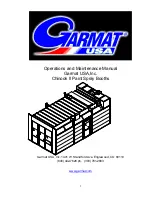
SECTION 8 – RECHARGE, INSPECTION, AND MAINTENANCE
2014-MAY-02 REV. 0 PAGE 8-5
MAINTENANCE (Continued)
h. Disassemble actuator and inspect for damage. Using
small wood dowel gently push puncture pin and spring
out of body being careful not to bend puncture pin.
Retain all parts for re-assembly. See Figure 8-9.
FIGURE 8-9
ELECTRIC-PNEUMATIC ACTUATOR
RETAIN ALL PARTS FOR RE-ASSEMBLY
009244
i. Inspect and replace all damaged components (o-rings,
flat gaskets, etc.).
j. Lubricate all o-rings and gaskets with Dow Corning #4
(or equal) and reinstall. Include o-ring on PAD.
k. Replace flat gasket semi-annually.
l. Install spring on puncture pin and insert into body. Push
down several times to confirm ease of movement.
m. Reassemble actuator.
n. Install actuator cap (if needed) and pressure test using
dry air or nitrogen.
8. Re-install Electric-Pneumatic Actuator on expellant gas
cartridge. See Section 5 – Installation and Programming,
page 5-11 and 5-12 for correct procedure steps 1-4.
9. Test system and place into service by completing all steps
in Section 6 - Operational Test and Place in Service, prior
to proceeding to Step 11.
10. Internal Battery Inspection/Replacement:
• When using internal power only, internal battery must
be replaced annually, after a discharge or when low
power is indicated (i.e., Power LED pulses Amber 1 x 10
seconds). To inspect the battery remove battery cover
and pull battery out of battery well. Review installation
date on battery to determine if battery requires replace-
ment (i.e., greater than 12 months).
• When using dual power, internal battery must be
replaced when there is a low power indication (i.e.,
Power LED pulses Amber 1 x 10 seconds) or battery
life remaining is less than 25%. Percent of battery life
remaining is listed in the header information of the Event
History Log. To save or view the Event History Log
review Section 5 – Installation and Programming, page
5-31, for manual download instructions or page 5-36 for
viewing with the ANSUL CHECKFIRE 210 Programmer
software.
• When replacing the battery module (e. g., during annual
maintenance) the battery life indicator must be reset
using the ICM or connect to a PC with the ANSUL
CHECKFIRE 210 Programmer software.
a. Replace the battery module with a new/unused
unit. Record the replacement date on the inside
sticker of the battery compartment cover and on the
battery itself.
b. Reset Battery Life Indicator:
ICM Instructions:
1) Place the CHECKFIRE 210 System into isolate
mode using the isolate switch on the side of
the ICM. (Amber Isolate LED and sounder on
the Display Module will quickly pulse 2 x 30
seconds.)
2) Press and hold the programming button for more
than five seconds then release.
3) All programming LEDs pulse 3 times in one
second to confirm battery life indicator is reset.
4) Cancel isolate mode by returning the isolate
switch to the normal position.
PC
Instructions
When connected to the ANSUL CHECKFIRE 210
Programmer software, click the Reset button in the
Battery Life Remaining section.
CAUTION
Performing a reset of the battery life indicator without
installing a new/unused replacement battery module
can result in faulty battery indications and unpredict-
able CHECKFIRE 210 System operation.
CAUTION
Contact your local waste disposal company for infor-
mation concerning the correct disposal of lithium
batteries.
11. For fire suppression system maintenance refer to appropri
-
ate system manual (latest edition)
• LT-A-101-10/20/30 Manual
(Part No. 24327)
• LT-A-101-50/125/250 Manual
(Part No. 427865)
• LVS Manual
(Part No. 427109)
12. Confirm all system equipment has been properly serviced
and recharged, and visual inspection seals are in place on
all EMAs and CHECKFIRE 210 Display Module.
13. Record date of maintenance on tag and in permanent
record file. Notify operating personnel system is back in
service.
CHECKFIRE 210
Detection and Actuation System
RELEASE CIRCUIT
DROP CABLE
CONNECTOR
















































